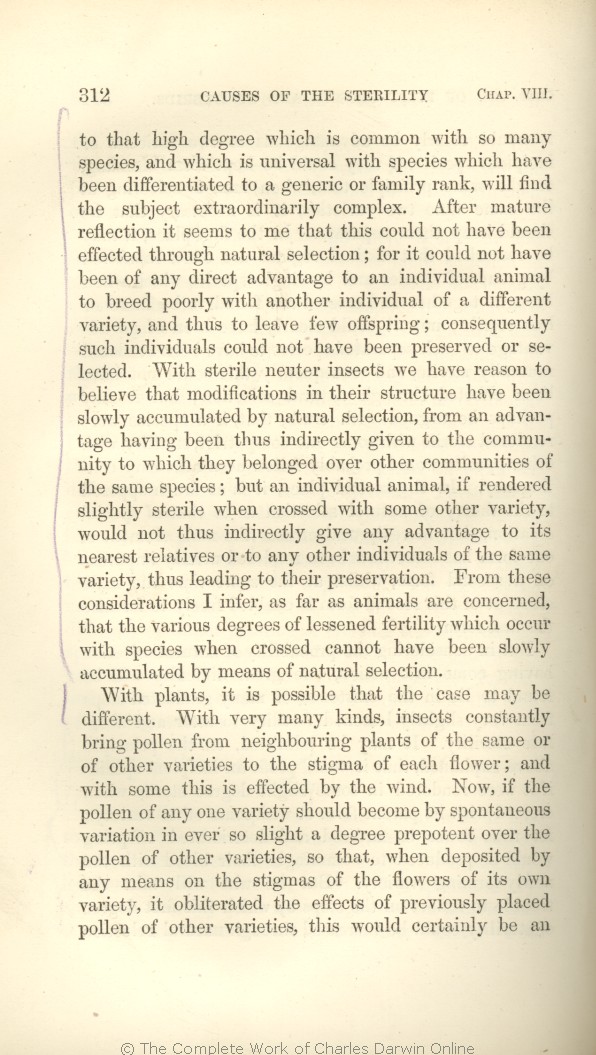to that high degree which is common with so many species, and which is universal with species which have been differentiated to a generic or family rank, will find the subject extraordinarily complex. After mature reflection it seems to me that this could not have been effected through natural
selection; | selection; 1866 1869 | | selection. 1872 |
| could 1866 1869 | could 1872 |
| direct 1866 1869 | direct 1872 |
| advantage 1866 1869 | advantage 1872 |
| individual 1866 1869 | individual 1872 |
| animal 1866 1869 | animal 1872 |
| breed 1866 1869 | breed 1872 |
| poorly 1866 | | badly 1869 | poorly 1872 |
| another 1866 1869 | another 1872 |
| individual 1866 1869 | individual 1872 |
| different 1866 1869 | different 1872 |
| variety, 1866 1869 | variety, 1872 |
| leave 1866 1869 | leave 1872 |
| offspring; 1866 1869 | offspring; 1872 |
| consequently 1866 1869 | consequently 1872 |
| individuals 1866 1869 | individuals 1872 |
| could 1866 1869 | could 1872 |
| preserved 1866 1869 | preserved 1872 |
| selected. 1866 1869 | selected. 1872 |
| 2 blocks not present in 1859 1860 1861 1866; present in 1869 1872 | | Or
take
the case of two
species which
in their present state
when crossed, produce few and sterile offspring; now, what is there which could favour the survival of those individuals which happened to be endowed in a slightly higher degree with mutual infertility, and which thus approached by one small step towards absolute sterility?
Yet an advance of this kind, if the theory of natural selection be brought to bear, must have incessantly occurred with many species, for a multitude are mutually quite barren.
|
| have 1866 |
| and fertility have 1869 1872 |
| animal, 1866 | | animal 1869 1872 |
| if 1866 |
| not belonging to a social community, if 1869 1872 |
| indirectly give 1866 | | itself gain 1869 1872 |
| to its nearest relatives or to any 1866 |
| or indirectly give any advantage to the 1869 1872 |
| 3 blocks not present in 1859 1860 1861 1866 1869; present in 1872 | | But it would be superfluous to discuss this question in detail; for with plants we have conclusive evidence that the sterility of crossed species must be due to some principle, quite independent of natural selection.
Both Gärtner and Kölreuter have proved that in genera including numerous species, a series can be formed from species which when crossed yield fewer and fewer seeds, to species which never produce a single seed, but yet are affected by the pollen of certain other species, for the germen swells.
It is here manifestly impossible to select the more sterile individuals, which have already ceased to yield seeds; so that this acme of sterility, when the germen alone is affected, cannot have been gained through selection; and from the laws governing the various grades of sterility being so uniform throughout the animal and vegetable kingdoms, we may infer that the cause, whatever it may be, is the same or nearly the same in all cases.
|
|
With plants, it is possible that the case may be
different. | different. 1866 | | some-what different. 1869 |
| same or of other varieties to the 1866 |
| OMIT 1869 |
| this 1866 | | species this 1869 |
| any one 1866 |
| a variety, when deposited on the stigma of the same 1869 |
| variety 1866 | | variety, 1869 |
| so that, when deposited by any means on the stigmas of the flowers of 1866 |
| this would certainly be an advantage to the variety; for 1869 |
| variety, it 1866 |
| pollen would thus 1869 |
| obliterated 1866 | | obliterate 1869 |
| previously placed 1866 | | the 1869 |
| this would certainly be an advantage to the variety; for it would thus escape being bastardised and deteriorated in 1866 |
| and prevent deterioration of 1869 |
|









